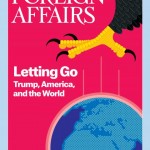In the aftermath of World War II, the United States set about building a global, rules-based economic order. At the heart of that order, it put the liberal values of free trade and the rule of law. Over the next seven decades, the order, backed by U.S. power and bolstered by its growing legitimacy among other countries, prevented most economic disputes from escalating into mutually destructive trade wars, let alone military conflict. That allowed even the smallest and poorest countries to develop their social and economic potential without having to worry about predation by stronger neighbors. By taking much of the fear out of the global economy, the U.S.-led order allowed market decisions to be driven by business, not bullying.
Today, that order is under threat. U.S. President Donald Trump has rejected the idea that the world’s economies all benefit when they play by the rules. Instead, he has decided that putting “America first” means withdrawing from supposedly bad deals, on which he believes the system is based. So
far, Trump has failed to follow through on his most destructive ideas. But the damage has already begun to show. His administration has hobbled the World Trade Organization, encouraged China and other autocratic regimes to lean on their smaller neighbors for economic loyalty, undercut agreements on tax
evasion and climate change, and pushed even major U.S. allies to negotiate freetrade and cross-border investment deals without the United States.
ADAM S. POSEN is President of the Peterson Institute for International Economics. Follow him on Twitter @AdamPosen.
This article appeared in the Foreign Affairs 2018 March/April edition. It is republished here with permission.
This article was originally published by Foreign Affairs. You can read the rest of the article here.
You can read exclusive content from Gateway House: Indian Council on Global Relations, here.
Copyright © 2018 by the Council on Foreign Relations, Inc.


